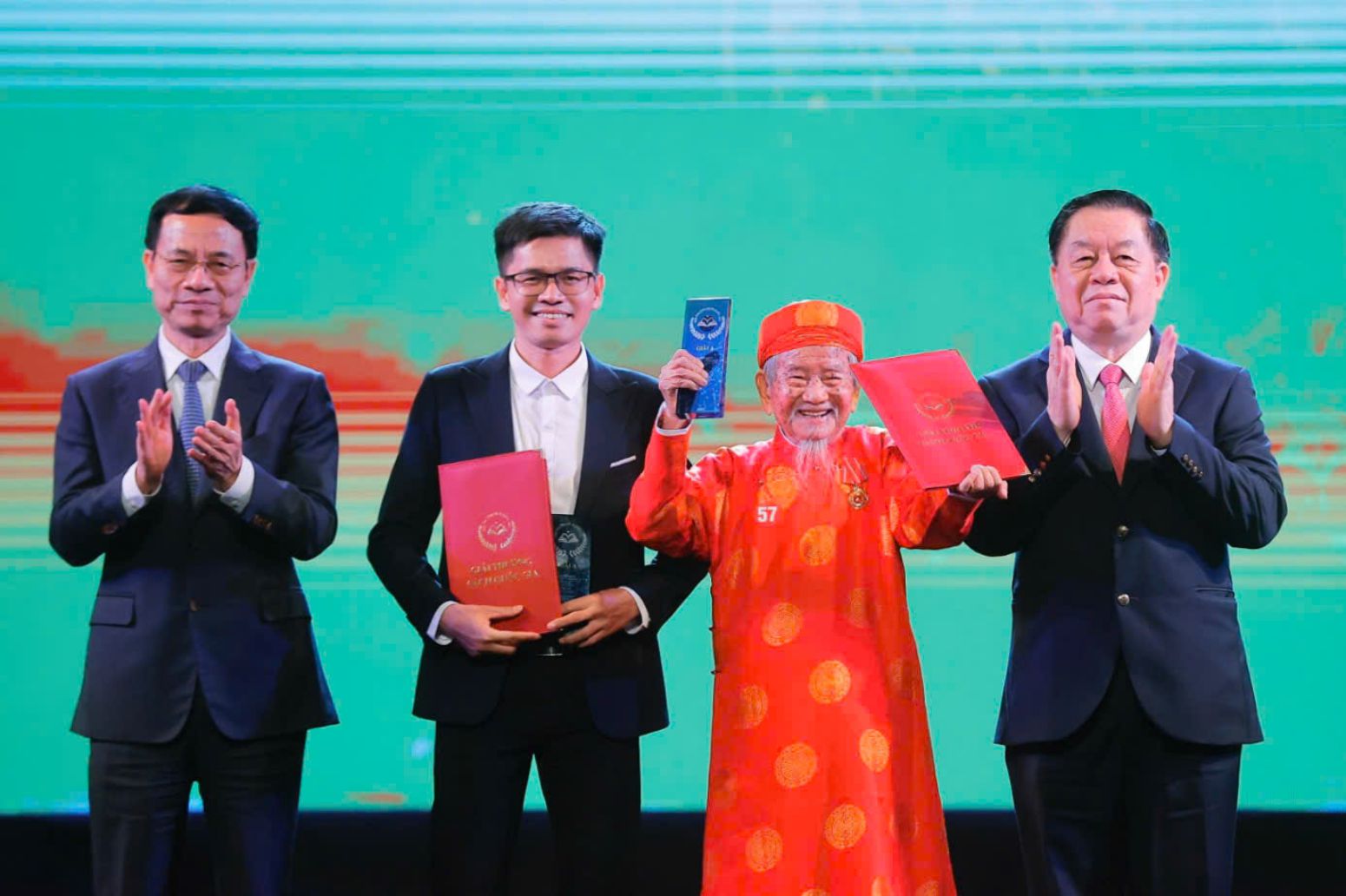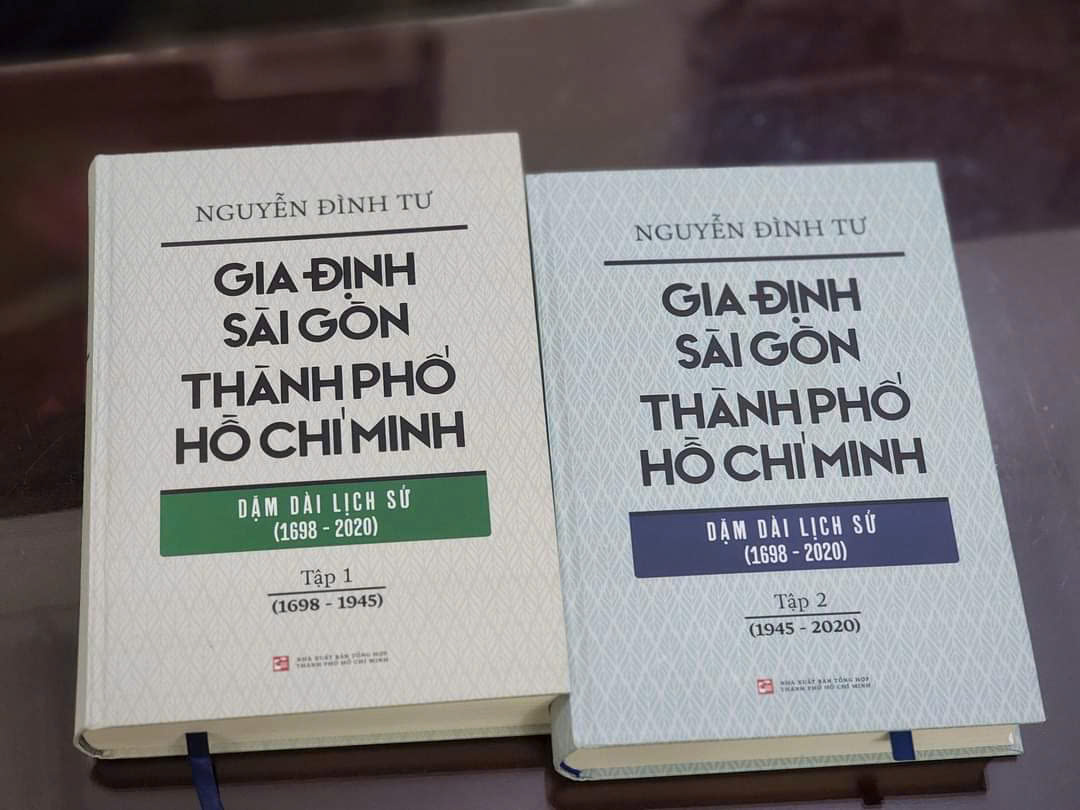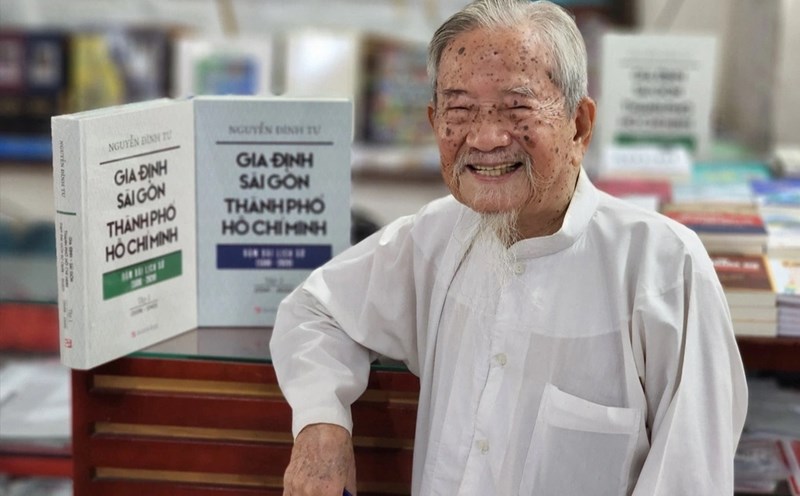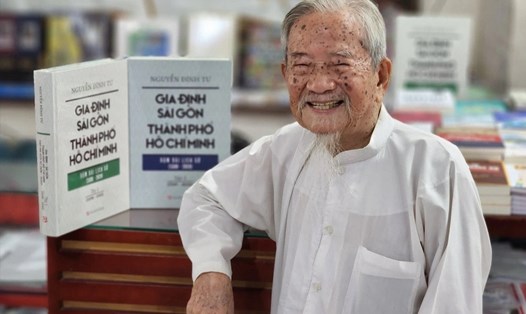On the occasion of his visit to Hanoi, author Nguyen Dinh Tu had a conversation with a reporter from Lao Dong Newspaper to look back on his 80-year writing journey.
Researcher Nguyen Dinh Tu traveled a long way to the Capital to receive the A prize of the National Book Award. How did he feel when receiving this award for the second time?
- I am very happy to be in Hanoi to attend the National Book Awards! A book series winning the A prize, for a writer like me, there is nothing more honorable. I always hope that my work will be welcomed by society and highly appreciated by experts. I want the documents and information I provide in the book to be evaluated by experts and the evaluation board for accuracy. An individual can be subjective, but when I am recognized by such a big award, I am very happy because many years of compilation efforts have been rewarded.
The second time I received the A prize of the National Book Award, I was even more honored and very happy. Receiving the A prize is difficult, some authors only get it once in their lifetime. But I have the honor of receiving it for the second time, that is something I cherish.

The monumental work about Ho Chi Minh City was conceived by you for more than 20 years. During the journey, what difficulties did you encounter in searching, synthesizing materials and completing the work?
- It took me more than 20 years to complete the book series "Gia Dinh - Saigon - Ho Chi Minh City: Long Mile of History (1698 - 2020)". The most difficult part is collecting documents, how to provide accurate documents to readers, convincing arguments, not confused or superficial. If the book is made carelessly, it will not bring any value to readers.
I wrote this book in two periods, the first time was in 1998 on the occasion of the 300th anniversary of Saigon (now Ho Chi Minh City). I saw that the anniversary was coming but no one had written a book about Ho Chi Minh City, so I made an outline and sent it to Professor Tran Van Giau for review. When it was approved, I only had 3 months to complete it before the anniversary took place. I wrote day and night, collecting materials.
At that time, there were no computers, I had to write the manuscript and then send it to the typewriter, which took a lot of time. I had to hire a typist to save time writing. When the work was completed, the Institute of Social Sciences set up an evaluation board. The board evaluated the work as meeting the quality standards for publication. At that time, the book was 98% complete, just waiting to be introduced to readers, but it was not successful. I am very sorry that all the effort I put in was not published. The documents I collected are very valuable and rare, so I hope that one day, I will use those materials again.
I kept the 4-volume manuscript for 20 years. Now that my attitude, stance, and perspective on history have changed, I know it is time to rewrite the book. I reviewed the manuscript, supplemented any missing parts, corrected any errors, and looked up additional documents from 1998 to 2020. The publisher and editorial board worked carefully and compiled for a whole year to complete the printing and distribution.
His book series with its huge amount of information has overwhelmed experts and the public. Is the author satisfied with the second A prize of the National Book Award in his career?
- I still want to write more. There are about 10 works that I am cherishing, but I don't know if my age and health will allow me to complete all 10 projects. I once wrote the book "Dictionary of Administrative Place Names of Southern Vietnam", which won the Silver Prize of the Vietnam Publishing Association, at that time there was no National Book Award yet. After that, many people encouraged me to continue writing for the Central and Northern regions. I think if I have time and health, I still want to write 2 more books to complete the whole country, leaving valuable documents for future generations.
I delve into the history of the region, just like how my hometown has changed its name many times, and also to let people know what their place used to be called. If it is not recorded, no one will know how our hometown was formed. Sometimes I have to find 3-4 books to identify a place name in history. I think the book about Central Vietnam will be twice as thick as the book about Ho Chi Minh City. I have started writing a book about administrative place names in Central Vietnam. However, I know I don't have much time left, so I write day and night, sometimes staying up until 1am to write.

What motivated you to persevere, research local geography, and carry out monumental works for history?
- I think the reason why I have been writing diligently for the past 80 years is because of my patriotism. I love my country, I love my compatriots, I respect my ancestors, I want to preserve the glorious history of my ancestors. Our people have protected the country through many resistance wars, maintaining independence. As a Vietnamese citizen, I am proud of the history of my nation.
Everyone wants to ask, what is the secret that helps the author have good health and a clear mind at the age of 104?
- To me, health is more precious than gold. Only with health can we create other material things. To protect health, we must exercise. First of all, the elderly often suffer from joint pain, so I exercise regularly to keep my bones and joints supple. Second, I must live seriously, not be promiscuous, and not get involved in social evils. I don't smoke, don't drink alcohol, and don't even drink coffee.
Third, we must be forgiving, do not resent anyone, causing negative emotions. Fourth, we must be optimistic, love life, and cherish what we have. Finally, I have a strong passion for history, and I study and write tirelessly day and night.
You were honored as a Lifetime Ambassador of Reading Culture to spread reading culture to the public. What does that title mean to you?
- I am passionate about reading and writing. Thanks to reading, I can write books. I always tell young people to read a lot of books, not to indulge in entertainment or watch mobile devices because that only solves temporary information needs. If you want to accumulate knowledge, you need to read books. When I was chosen as the Ambassador of Reading Culture, I thought that I received that title because I love reading.
Many people are passionate about mobile phones, they think that opening the internet means everything, but I am a researcher, I almost never use a phone. There is a lot of error in the information on the internet, so depending on it is very dangerous. I hope that students are encouraged to read, study by themselves, research and read more from books.
As the author of many books on history, what do you think is the most important thing when studying history?
- I hope that future generations writing about history can maintain objectivity. Historical events take place depending on the reality at that time, not according to anyone's wishes. Because everyone wants to win, but the objective and subjective conditions at that time make one side lose, the other side win. Writing about history, we must clearly state the good and the bad, we cannot arbitrarily praise or criticize, turn black into white, causing future generations to misunderstand the historical past.
Looking back on the journey from a boy born in a poor countryside to a researcher passionate about history, does author Nguyen Dinh Tu have any memories to tell?
- I used to live in difficult circumstances, there was a flood in Nghe An, I ate congee for 3 months. I carried soil, built dikes, worked hard to get congee to eat, very hungry and miserable. Or after the country was liberated, I repaired bicycles on the roadside, saved every penny to make ends meet. At that time, I was still optimistic and loved life, still took the time to write books.
When we have ultimate passion, we will overcome everything to reach the end of our passion.











